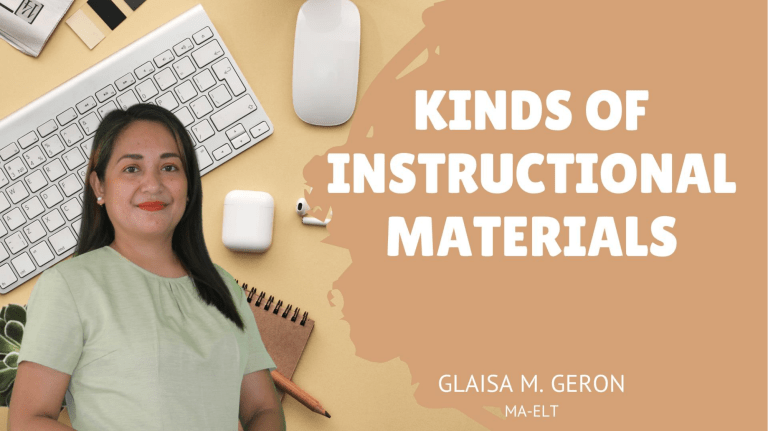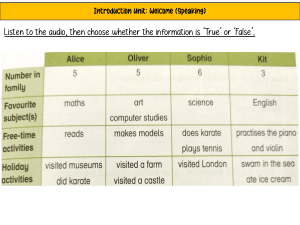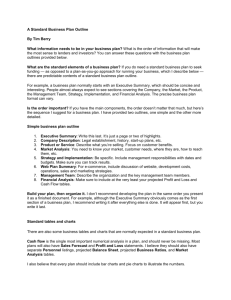
N P D I R E T S M T R L A E I A PRINTED MATERIALS G A R I P C H GRAPHIC O N N P J RC T DOE E Y L P D S I A NON-PROJECTED DISPLAY D OOE T D RP J Y L P D S I A PROJECTE D DISPLAY I A D AUDIO O U KINDS OF INSTRUCTIONAL MATERIALS PRINTED AND DUPLICATED MATERIALS AUDIO AIDS VISUAL AIDS KINDS OF INSTRUCTIONAL MATERIALS EXHIBITS OBJECTS AUDIO-VISUAL AIDS KINDS OF INSTRUCTIONAL MATERIALS DEMONSTRATION S COMMUNITY RESOURCES I. PRINTED AND DUPLICATED MATERIALS All textual and handout materials to be used by the students or trainees which can be run off in large numbers by printing machines, photocopiers, and duplicators Textbooks • a systematic arrangement of subject matter designed to assist the teacher in a particular content to students at a specific grade level Supplementary Materials • best sources of idea and information, particularly on current topics, otherwise not available from textbooks • Use to augment ideas given by the teacher Supplementary Materials include the following: 1. 2. 3. 4. 5. 6. 7. Workbooks Duplicated outlines Teacher-prepared study guides Reference book Pamphlets Magazine articles newspapers II. AUDIO AIDS • All the various systems whereby straight forward audio material can be played to a class, group or individual Audio Aids include the following: 1. Cassette 2. Radio 3. Tape recorder III. VISUAL AIDS • • help teachers establish, explain, connect, and associate ideas and concepts to make the process of learning more interesting, enjoyable, and effective devices that help the teacher to clarify, establish, and correlate and co-ordinate precise conceptions, understandings and appreciations and support him to make learning more actual, active, motivating, encouraging, significant (Shabiralyani, Ghulam et. Al., 2015) A. Chalk board • most versatile medium for instruction since it is always available • very useful in presenting variety of instructional materials and important medium for demonstration B. Still Pictures • Help illustrate and teach specific lesson or topics • Help learners recall information and visually explained information that would be difficult to convey using only verbal or written terms • Can be Non-projected or Projected a. Non-projected • All visual displays that can be shown to the class, small group, or individual student without the use of an optical or any electronic projector. 1.Photographs • pictures which are produced by a camera • Can appear in full color or black and white 2. Illustrations • a visualization that is made by an artist to explain information • visually represent facts and details b. Projected • media formats in which visual and verbal images are projected or enlarged on a screen by passing through a transparent material or through opaque material b. Projected • Motion pictures, filmstrips, slides of various sizes, transparencies for overhead projection, and specialized equipment such as rear screen projection or an opaque projector. b. Projected a. Slides • small transparent photographs individually mounted in a slide projector for one-at-a-time projection b. Projected b. Filmstrips • contains series of related still pictures placed in sequential order • Individual picture is called frame b. Projected c. Opaque projections • Uses nontransparent material • Used with OHP b. Projected d. Overhead Projection • Done using an overhead projector and overhead transparencies b. Projected e. LCD Projections • type of projector based on liquid crystal displays which can display images, data or video C. Graphic Materials • From the Greek word, “graphein” which means to write, to draw, or to represent by lines • Present summarized information drawings words, pictures, and symbols through a. CHARTS Present relationship such as chronologies, quantities and hierarchies Present a combination of pictorial, graphic, numeral or verbal material Plot specific information Present information in tabular or graphic format Types of Charts • Flow charts • Classification Charts • Tabular Charts • Organizational Charts • Tree charts • Timeline Charts b. GRAPHS Represent numerical data Illustrate relationship among units of data Could be produced from tabular charts Types of Graphs • Line Graph • Bar Graph • Circle or Pie Graph • Picture Graphs or Pictographs c. DIAGRAMS Consist of lines and symbols that show relationships or key features of a process, an object or an area Different from charts because it explains how something works Clarify relationship between the parts of a whole Types of DIAGRAMS • Venn Diagram • Cycle Diagram • Radial diagram • Pyramid diagram • Target diagram d. Maps and globes Map: represent a portion of the earth’s surface Spherical model of the earth; 3D e. Posters Combines images, color, lines and words Catch viewer’s attention to brief, persuasive message Should be simple, attractive and convey message quickly D. EXHIBITS • Displays of various objects designed to form an integrated whole for instructional purposes • Feature various forms of visual media, models, and real objects E. OBJECTS • Includes: 1. specimens 2. realia 3. models IV. AUDIO-VISUAL AID • uses audio and visual as a mode of learning. The literal meaning of audio is hearing and visual means that is seen by eyes • Includes: 1. Motion pictures 2. television 3. videotape V. DEMONSTRATIONS • a process that teaches learners how to complete a task using actual materials • The audience level and size can impact the effectiveness of the demonstration (Smith, Wenderoth, & Tyler 2013). • assist in teaching a skill with multiple steps • They engage the audience and encourage audience participation VI. COMMUNITY RESOURCES 1. Field Trips 2. Resource Person VII. Others 1. Laboratories 2. Programmed Instruction “The appropriateness of instructional materials must be judged from the perspective of the student/learner rather than the teacher.” “All instructional materials are aids to instruction. They do not replace the teacher.” Reference: https://prezi.com/mwyhq9j9vzbe/types-of-instructionalmaterials/?fbclid=IwAR3LKnkxqeRzkfE4c3F8B4z5zf_oahsiJuXpXsb7QPUf6PzT8kFHynbt8k



